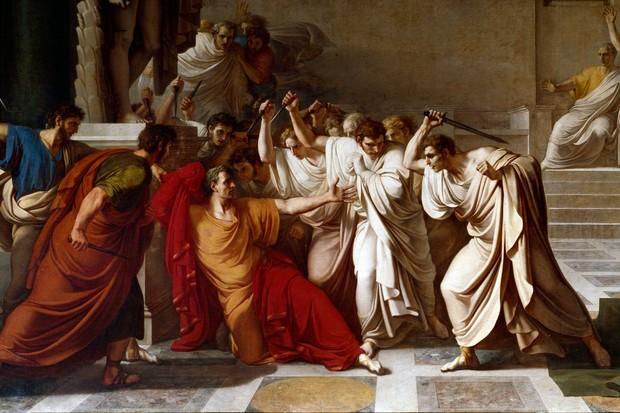在我们汉语中,12个月是按照从1数到12的方式来命名的,如1月,2月,3月等等,在英语中,12个月集齐了神的名字,统治者的名字还有数字,大家跟着Vivian 老师来一起看看吧。
在看月份名称来源之前,老师先带大家看看日历的演变。
1. 古罗马日历 Ancient Roman Calender
初代古罗马日历中一年只有10个月,总计304天,因为罗马人把深冬的61天排除在了日历之外,而这显然并不符合太阳的实际运行规律,所以罗马人决定又把这61天加上,改为了两个冬季月份(一月和二月),所以原来的一月和二月便成了三月和四月,后面的月份依次类推。

2. 儒略历Julian calendar
儒略历 是由罗马共和国独裁官儒略·凯撒(又译盖乌斯·尤里乌斯·凯撒)采纳埃及亚历山大的数学家兼天文学家索西琴尼的计算后,于公元前45年1月1日起执行的取代旧罗马历法的一种历法。
儒略历中,一年被划分为12个月,大小月交替;四年一闰,平年365日,闰年366日为在当年二月底增加一闰日,年平均长度为365.25日。

3. 格里历
由于实际使用过程中累积的误差随着时间越来越大,1582年教皇格里高利十三世(又译额我略十三世)颁布、推行了以儒略历为基础改善而来的格里历,即公历。
格里历特别规定,除非能被400整除,所有的世纪年(能被100整除)都不设闰日;如此,每四百年,格里历仅有97个闰年,比儒略历减少3个闰年。格里历的历年平均长度为365.2425日,接近平均回归年的365.242199074日,即约每3300年误差一日,也更接近春分点回归年的365.24237日,即约每8000年误差一日;而儒略历的历年为365.25日,约每128年就误差一日。到1582年时,儒略历的春分日(3月21日)与地球公转到春分点的实际时间已相差10天。因此,格里历开始实行时,将儒略历1582年10月4日星期四的次日,为格里历1582年10月15日星期五,即有10天被删除,但原星期的周期保持不变。

了解了日历的演变之后,大家一起来看看每个月份名称的具体由来吧!
JANUARY一月
Named for the Roman god Janus, protector of gates and doorways. Janus is depicted with two faces, one looking into the past, the other into the future. In ancient Roman times, the gates of the temple of Janus were open in times of war and closed in times of peace.
一月January是以罗马的守护神(门神)雅努斯来命名的, 雅努斯有先后两副脸,一副回顾过去,一副要眺望未来。在古罗马, 雅努斯庙的大门在战争开启时打开,恢复和平后关上。 人们认为选择他的名字作为除旧迎新的第一个月月名,很有意义。
FEBRUARYFrom the Latin word februa, “to cleanse.” The Roman calendar month of Februarius was named for Februalia, a festival of purification and atonement that took place during this period.
二月February 来源于拉丁词februa,意为“打扫”罗马日历的二月是以Februalia净化节来命名的,人们在这个节日里净化自己的灵魂和赎罪。
marchNamed for the Roman god of war, Mars. This was the time of year to resume military campaigns that had been interrupted by winter.
三月March是以罗马战神的名字Mars来命名的。 三月是一年中开始恢复征战的月份,这也是为什么march 这个单词有“行军”的意思的原因吧。
APRILFrom the Latin word aperio, “to open (bud),” because plants begin to grow in this month. In essence, this month was viewed as spring’s renewal.
四月April来源于拉丁文“aperio”意为“开花”因为植物在这个月开始生长,本质上来说,这个月被看成是春天的复苏。
MAYNamed for the Roman goddess Maia, who oversaw the growth of plants. Maia was considered a nurturer and an earth goddess, which may explain the connection with this springtime month.
五月May是以罗马女神 Maia来命名的,她负责植物的生长。Maia被看成是负责培养的大地女神, 这也解释了女神的名字和这个春季的月份的联系。
JUNENamed for the Roman goddess Juno, patroness of marriage and the well-being of women.
六月June是以罗马女神 Juno来命名的, Juno负责婚姻和女性的福祉。
JULYNamed to honor Roman dictator Julius Caesar (100 B.C.– 44 B.C.) after his death. 七月July是为了纪念凯撒大帝。
AUGUSTNamed to honor the first Roman emperor (and grandnephew of Julius Caesar), Augustus Caesar (63 B.C.– A.D. 14). Augustus (the first Roman emperor) comes from the Latin word “augustus,” meaning venerable, noble, and majestic.
八月August是为了纪念第一个罗马上帝 Augustus Caesar. Augustus这个名字来源于拉丁文augustus,意思是“令人尊重的,高贵的, 威严的”
SEPTEMBERSeptember comes from the Latin word septem, meaning “seven,” because it was the seventh month of the early Roman calendar.
九月September来源于拉丁文septem,是“七”的意思,因为在古罗马日历中,九月是第七个月(古罗马日历中,只有十个月有正式的名字,March to December, 因为冬天的时候休战,所以一月和二月未命名)
OCTOBERIn the ancient Roman calendar, October was the name of the eighth month of the year. Its name comes from octo, the Latin word for “eight.”
在古罗马日历中,十月October是每年的第八个月,十月来源于拉丁文octo, 意思是“八”。
NOVEMBERFrom the Latin word novem, “nine,” because this had been the ninth month of the early Roman calendar.
十一月November来自于拉丁文“novem”意思是“九”,因为在古罗马日历中,十一月是第九个月。
DECEMBERFrom the Latin word decem, “ten,” because this had been the tenth month of the early Roman calendar.
十二月December来自于拉丁文 “decem” 意思是“十”因为这是古罗马日历的第十个月
图片来源于网络,如有侵权,立即删除
收录于话题 #英语知识
7个
上一篇天气转冷 under the weather 和天气有关吗
,




